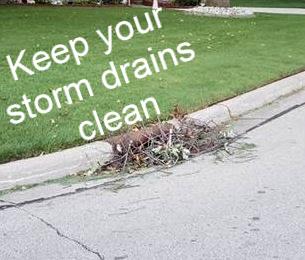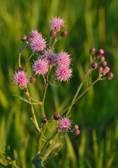Prevent street flooding and stream pollution by keeping the area around storm drains free from debris
Rain and melting snow tend to wash soil, litter, pet waste, fertilizer and lawn clippings off your property into the storm drain – storm water runoff doesn’t go to a treatment plant, it often goes straight into our streams. Storm drains can become clogged with excess leaves, tree branches and trash, which can lead to storm drain back-ups that flood streets, your yard and possibly your basement! Trash and contaminants that flow from storm drains into our local rivers eventually empty into the Bay. It may not seem like a big deal, but you can do a lot to keep our waterways clean just by tidying your yard, disposing of trash properly, cleaning up after your dog, and by encouraging your neighbors to do the same. Here are some simple steps to keep your storm drain and your waterways clean:
• Keep a tight lid on your trash and recycling bins, especially during windy days.
• Pick up trash in your community.
• Do not rake leaves into the street.
• Don’t blow lawn clippings into the street. Direct them onto your property so they can be added to your compost bin, or bag them and bring to the LeBrun Yard Waste Site.
• Limit use of sand and salt on your driveway and walkways. Sweep up residual sand once the snow and ice has melted and before the next rain storm so the sediment doesn’t end up in the stream.
• Pick-up after your dog! Stormwater will pick up the waste and wash it into the storm drain. Pet waste contains harmful bacteria that impact stream wildlife and water quality.
• Limit fertilizer, pesticide and herbicide use.
• It is illegal to allow pollutants to flow into a storm drain. If you see someone dumping or not containing pollutants report it.






